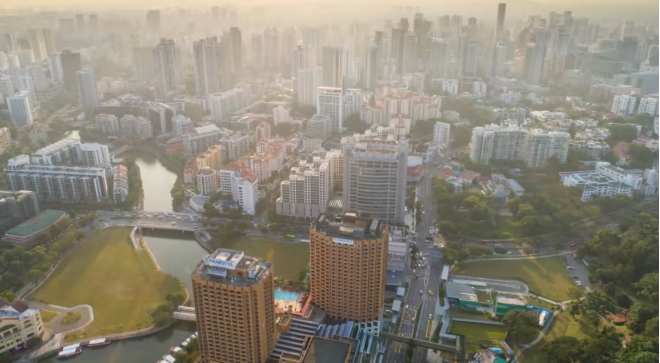May 21, 2025 | 10:12 GMT +7
May 21, 2025 | 10:12 GMT +7
Hotline: 0913.378.918
May 21, 2025 | 10:12 GMT +7
Hotline: 0913.378.918
Experts tell CNA about the myriad ways AI can help in our race against time.

Singapore's city skyline. Photo: iStock
With the meteoric rise of artificial intelligence, companies are tapping on one behemoth to tackle another beast – climate change.
While AI may have entered everyday usage with generative AI like ChatGPT, the sustainability space is no stranger to its benefits, such as predicting extreme weather events or climate-related disasters by analysing data.
According to the World Meteorological Organization in May, global temperatures are – for the first time – likely to break 1.5 degrees Celsius of warming within the next five years. This threshold signifies the point of no return where the worst effects of climate change would become irreversible.
Singapore, too, has felt the impact of climate change. In May, the country again hit its record high of 37 degrees Celsius, which was last experienced in 1983, and is set to experience days with peak temperatures of 40 degrees Celsius as early as 2045.
With time running out, some companies are hoping the latest wave of the digital revolution will eventually turn the tide.
As smart cities emerge, AI can be “pivotal” in informing national decision-makers on the most pressing climate challenges, Google’s chief sustainability officer Kate Brandt told CNA.
“Through my interactions with many governments and policymakers worldwide, many have shared that they’re seeking innovative localised solutions to climate change that can be deployed in their countries and regions,” she said.
“However, a common challenge is the lack of tools to effectively harness complex data, which is required to develop new insights and plans of action.”
For starters, there are two main aspects of tackling climate change: Mitigation and adaptation, said director of the Agency for Science, Technology and Research’s (A*STAR) Centre for Frontier AI Research, Professor Ivor Tsang.
Mitigation involves reducing the extent of emissions and preventing further climate change, while adaptation is about responding to the existing effects of climate change.
In an urban setting, AI can address both these areas by enhancing complex systems, such as microgrids or buildings, to “make them more energy-efficient and/or be more robust to climate change”, said Prof Tsang.
It can also “accelerate the design and development of relevant technology and capabilities”.
At A*STAR, for example, AI is incorporated into its work for engineering design, including for “new, performant materials” that are “critical to green chemistry and catalysis and/or renewable energy”, explained Prof Tsang.
These methods can be used to “develop methods or catalytic materials for carbon capture and utilisation”.
In a green energy-based future, the energy mix will be “much more complex”, including wind and solar. It can also be "intermittent", depending on factors such as the changing weather, he noted.
“Hence, AI is being used in the development of energy storage solutions such as batteries for facilitating this transition towards electrification and green energy for a decentralised grid of the future,” he said.
“Similarly, better forecasting of the availability of intermittent renewable energy such as solar, and the optimisation of these systems can allow us to move towards a net-zero future.”
AI can also be used in “greening building operations”, added Prof Tsang, pointing to “energy-hungry” data centres.
AI can improve designs to maximise ventilation and reduce the need for cooling, such as via air-conditioning, even in an “increasingly warming climate”. In turn, these AI models can serve as predictive models for “digital twinning”, enabling greener and more energy-efficient operations.
At the consumer level, Google’s Ms Brandt shared that AI is helping to recommend the best charging stops for electric vehicle users in Singapore on Google Maps. These suggestions are based on factors like current traffic situation, charge level and expected energy consumption.
(CNA

(VAN) Attempts to bring down the price of the Japanese staple have had little effect amid a cost-of-living crisis.

(VAN) Fourth most important food crop in peril as Latin America and Caribbean suffer from slow-onset climate disaster.

(VAN) Shifting market dynamics and the noise around new legislation has propelled Trouw Nutrition’s research around early life nutrition in poultry. Today, it continues to be a key area of research.

(VAN) India is concerned about its food security and the livelihoods of its farmers if more US food imports are allowed.

(VAN) FAO's Director-General emphasises the need to work together to transform agrifood systems.

(VAN) Europe is facing its worst outbreak of foot-and-mouth since the start of the century.

(VAN) The central authorities, in early April, released a 10-year plan for rural vitalization.